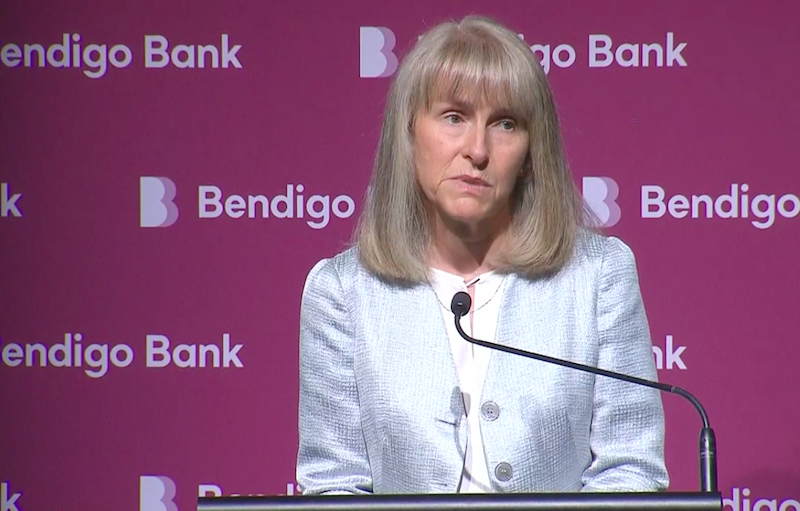
Jacqueline Hey, chair, Bendigo and Adelaide Bank
Bendigo and Adelaide Bank yesterday declared war on ANZ’s A$4.9 billion buyout of the banking operations of Suncorp after board chair Jacqueline Hey confirmed her company made several approaches this year to engage in strategic talks with the Queensland institution.
In an address to shareholders at her company’s annual meeting in Bendigo on Tuesday, Hey revealed that Suncorp “avoided engagement” with her bank despite “repeated approaches” to explore a potential merger.
The planned sale of the banking division to ANZ was announced in July but Hey’s bombshell observations yesterday triggered concern among some of Suncorp’s institutional investors that their directors had missed an opportunity to stoke competitive tension on the sale.
Hey indicated her critique of Suncorp was prompted by comments about the sale process made by Suncorp’s chair Christine McLoughlin at the company’s annual meeting in Brisbane in September.
“While our bank remains firmly focused on its organic growth strategy, it does from time to time consider mergers & acquisitions that will create value for shareholders and customers,” Hey told the Bendigo AGM.
“Whilst we do not comment on these type of activities in the normal course of business, given this one is public we do believe it’s important our shareholders are fully aware that Suncorp avoided engagement with our bank – despite repeated approaches – and instead announced a transaction with a big four bank.,” Hey told Bendigo shareholders.
“We believe this will only further entrench Australia’s banking oligopoly and provide sub-optimal outcomes for customers and communities.”
Hey noted that Bendigo was waiting “with interest” for the decisions of state and federal governments and the Australian Competition and Consumer Commission on whether the deal should proceed.
Hey’s comments could weigh heavily on Suncorp chair McLoughlin and her directors because they raise questions about the governance of the sale process.
At Suncorp’s annual meeting in September, McLoughlin did not disclose any details about Bendigo’s attempts to get to the bargaining table.
Instead, McLoughlin told her shareholders that a review of the banking business considered options to merge with other regional banks but these were found to be “inferior” to the ANZ offer and the company’s organic growth strategy.
“As the board of a public company, we have fiduciary obligations to act in our shareholders’ best interests,” McLoughlin said on 23 September.
“In this context and against this existing strategic analysis, we considered ANZ’s offer and found it to be compelling on all fronts.
“The review also considered the viability of consolidation amongst regional banking peers and found this option for Suncorp to be inferior to both the ANZ offer and our own organic plan.”
Banking Day last night contacted several of Suncorp’s institutional shareholders who described the board’s decision to snub Bendigo’s advances as ‘’odd” and “concerning”.
Most declined to comment publicly on Hey’s revelations, although First Super - a national industry super fund – said it was unsettled by the board’s decision to sideline Bendigo in the sale process.
“As a Suncorp shareholder we are very concerned about the Bendigo chair’s comments to shareholders that their approaches to Suncorp were rebuffed,” said First Super CEO Bill Watson.
“The concern on behalf of our members is whether money has been left on the table because of a failure to engage with an apparently serious buyer.”
If Hey is right about Suncorp’s avoidance of Bendigo’s approaches in the months leading up to the sale announcement, McLoughlin and her board face pointed questions about whether their efforts to meet their fiduciary obligations were optimal.
McLoughlin also justifies the ANZ deal on the grounds that the major bank has given commitments to grow the Suncorp brand and presence in Queensland.
However, ANZ’s aggressive program of branch closures across Australia in the last five years is likely to fuel concern within the Queensland Government that the Melbourne-based bank would eventually slash Suncorp’s network in the state.
While ANZ is the fourth largest bank in the country on asset and deposit measures, its branch network is now dwarfed by Bendigo’s national footprint.
According to APRA data, ANZ had only 414 branches at the end of June while Bendigo had 459 outlets.